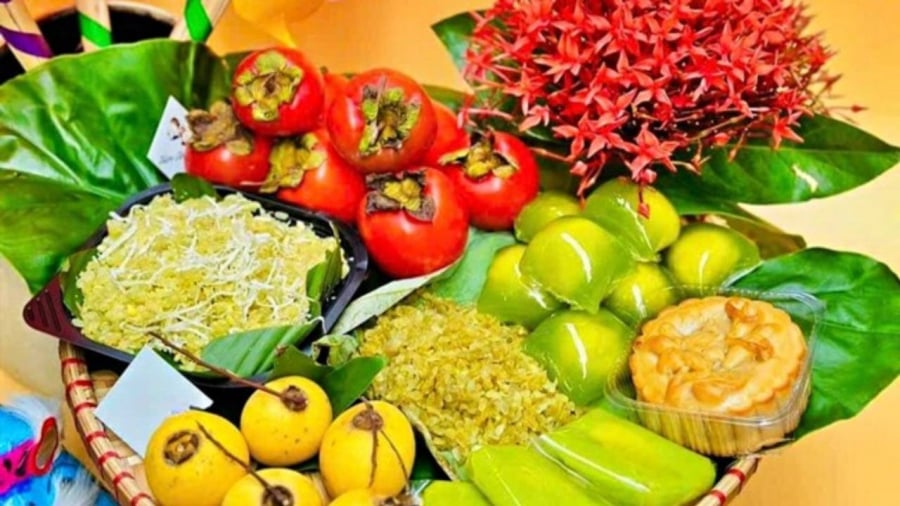Why do we perform worship rituals on the evening of the 15th day of the eighth lunar month?
In Vietnamese culture, the Mid-Autumn Festival is not only a holiday for children but also an important occasion for adults to carry out ancestral worship rituals and express gratitude to the heavens and the earth. Notably, worship rituals on the evening of the eighth lunar month are commonly practiced, differing from other lunar months when rituals are typically conducted during the day.
Here are the reasons why performing worship rituals on the evening of the 15th day of the eighth lunar month holds significant importance in terms of both feng shui and cultural traditions:

Evening Worship on the 15th Day of the Eighth Lunar Month
1. Moon Worship – A Traditional Ritual
The Mid-Autumn Festival is regarded as a moon worship holiday, signifying gratitude and prayers offered under the brightest moonlight of the year. The optimal time to perform the moon worship ritual is when the moon is at its highest point in the sky, which occurs in the evening, specifically during the Dậu hour (between 5 PM and 7 PM). During the day, when the sun is still shining brightly and the moon is not yet visible, performing moon worship would be inappropriate from both a feng shui and spiritual perspective.
Conducting the worship ritual on the evening of the eighth lunar month also presents an ideal opportunity for the family to gather and share a meal. Under the full moon, family members often engage in conversation, enjoy the festive food, and make wishes for a peaceful and happy life.
2. Significance of the Mid-Autumn Moon
The moon on the 15th day of the eighth lunar month is the brightest and clearest full moon of the year, symbolizing completeness and family reunion. Consequently, performing ceremonial rituals under the moonlight holds extraordinary significance, demonstrating reverence and gratitude to the heavens and ancestors for bestowing blessings of a bountiful harvest season. Many believe that the moonlight shining during the Mid-Autumn Festival brings good fortune, health, and prosperity to the family.
Additionally, the Mid-Autumn Festival is considered an occasion to venerate the moon – a symbol of the Yin, representing coolness and positivity. Beneath the radiant moonlight, families unite in lighting incense, performing rituals, and engaging in festive activities such as enjoying the festive food, carrying colorful lanterns, and watching lion dances, infusing the celebration with joy and warmth.
3. Reunion Day – Evening Worship to Foster Family Bonding
The Mid-Autumn Festival is also known as the Reunion Day, serving as an opportunity for family members to reunite and gather after a year of hard work. Lighting incense and worshiping the moon in the evening, just before the moon reaches its highest point, is the moment when the family has assembled, prepared the festive food, and is ready to light incense together, wishing for unity and lasting happiness.
Furthermore, the evening worship ritual expresses gratitude to the ancestors and seeks blessings from the higher powers as the moon illuminates the night. The moonlight of the Mid-Autumn Festival is not only a source of positive energy but also a testament to the beautiful wishes of each family member.
4. Mid-Autumn Festival – A Ritual of Gratitude to the Moon
The Mid-Autumn Festival occurs after the harvest season, so our ancestors often performed rituals to express gratitude to the moon in the evening, praying for a bountiful harvest in the coming year. The bright moonlight shining upon the earth and sky is considered a favorable sign, bringing smooth and fortunate energy to the people.
The Vietnamese also have a tradition of moon gazing to predict the harvest and the country’s destiny. If the moon is yellow, it signifies a bountiful silk worm season; a green or bluish moon foretells natural disasters, while an orange moon indicates a prosperous country and a well-fed people.
What is the best time for worship on the 15th day of the eighth lunar month if not in the evening?
Traditionally, worship rituals on the 1st and 15th days of the lunar month are usually performed in the morning or before noon to demonstrate reverence. However, for the 15th day of the eighth lunar month, the evening is the most suitable time for moon worship. If you cannot arrange the ritual in the evening, you may perform it in the morning before 9 or 10 AM when the yang energy is strongest, and the sunlight illuminates everywhere.
Lighting incense in the morning also brings good luck and fortune, as this is when yang energy flourishes, and fresh vitality abounds, ushering in a peaceful and hopeful new day.
Performing worship rituals on the evening of the 15th day of the eighth lunar month is not merely a spiritual practice but also an opportunity for families to unite, admire the moon, and wish for all the best in life. It is a time to strengthen family bonds, express gratitude to the heavens, and cherish the traditional cultural values of the nation.





































